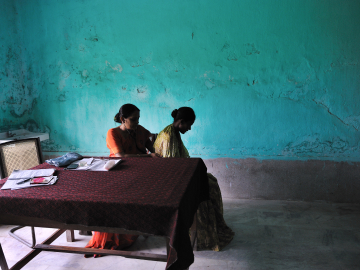Decolonizing Global Health: Respect Your Partners
Patricia Garcia has seen global health from many angles—from Seattle as an MPH student at the University of Washington, from high-level positions in Peru as Minister of Health and head of the country’s National Institute of Health.
Along the way, she’s often seen and fought the effects of global health colonization in Peru.
“In the Global North, the idea is that all things happen there,” Garcia says. “The money is there, yes. But we have brains here, too.” In this Q&A, she explains how colonization affects middle-income countries like Peru, and what can be done to prevent it.
What does colonialism look like from your viewpoint?
Here’s an example. A researcher from the North calls and says there is an opportunity for a grant and they need somebody from a low- or middle-income country. “Would you like to [be] on the grant?” So, you say OK, because you know that you may get to be involved and get a publication. But maybe it’s not the type of research that we really need. Or a drug company tests new drugs here, and then we don’t have access to them once the clinical trials are done.
And mentorships of students from high-income countries can be a problem for the host country. They take a lot of time, especially when the student doesn’t know your country or the language. It’s time I’m stealing from my students and my people. And mentors don’t receive salaries or real recognition for that.
Sometimes students from high-income countries come in and hire local students to do their work. And the incoming students take all the credit. That’s teaching them that it’s OK to make people from low-income countries do all the work but not get any credit.
How can people prepare for a learning experience in the Global South?
Students who come should be in touch with their local partner before they get there and do an equal amount of work once there—and not expect to have a babysitter.
And short stays like a month or less are not good for anybody.
Before coming, you should ask, what could be an interesting thing to do and what projects are already being worked on. If you have an idea, ask if it’s needed—instead of just using us as producers of samples without creating any local capacity. The only way to really help is to create capacities and to work shoulder to shoulder, hand to hand.
What’s an example of a project that supports decolonization?
Kuskaya—it’s a Quechua word for working together. We received funding to put together a student from the US and a student from Peru with the same salary. They didn’t need to be from the health field. We had lawyers, administrators, engineers, architects. They paired up online and decided to approach 1 problem in global health together. So, for example, we had a lawyer and a physician analyzing the laws and regulations that had to do with the day-after pill in Peru, where it was banned.
But the funding for Kuskaya wasn’t renewed, even though it was really successful.
More views on decolonizing global health here.
Join the 50,000+ subscribers in 170+ countries who rely on Global Health NOW summaries and exclusive articles for the latest public health news. Sign up for our free weekday newsletter, and please share the link with friends and colleagues.
Illustration by Yifan Wu




